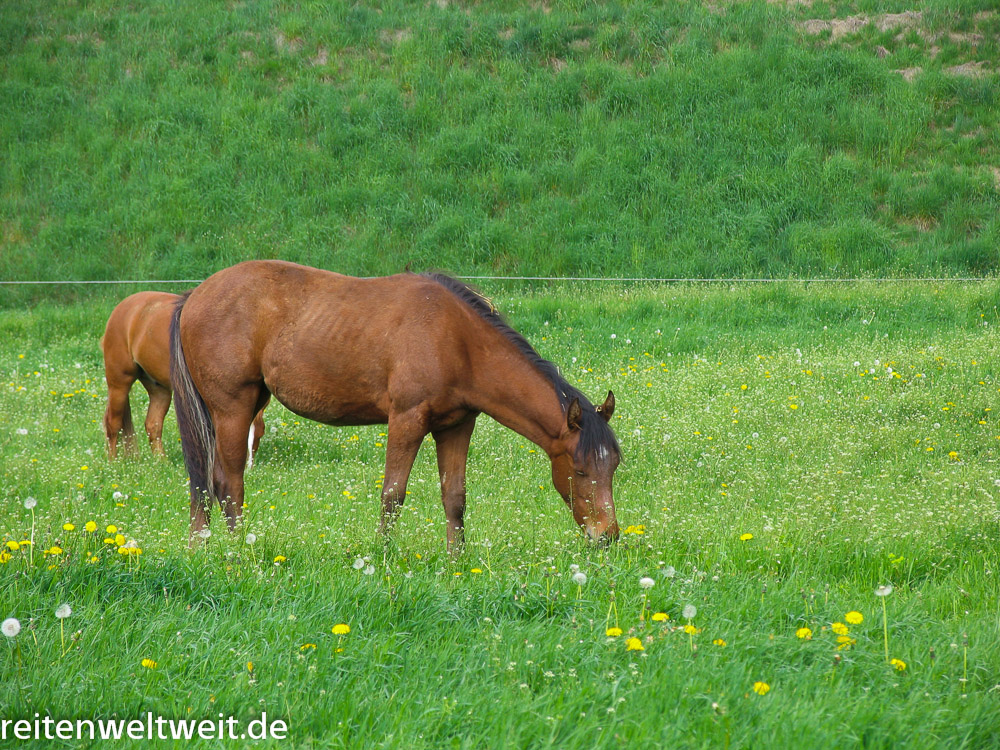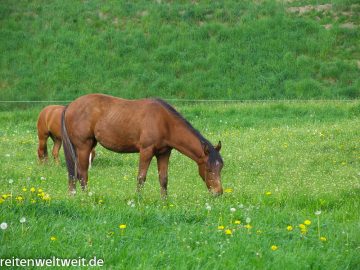The most important minerals for horses
 Minerals, sometimes also called dietary minerals or mineral nutrients, are essential for the entire organism:
Minerals, sometimes also called dietary minerals or mineral nutrients, are essential for the entire organism:
They are an element of bones and teeth, regulate enzyme systems and are responsible for the coordination of nerves and muscles. Moreover they influence the pressure on the cytoplasm.
Minerals are categorizes into nutrients and trace elements. Due to their important functions in the horses´ organism it is worth to take some time for some further information.
Overview of all nutrients
Phosphorus, Calcium
The horses´ organism provides more than 15 pounds of calcium (mainly located in the bones) and nearly 9 pounds of phosphorus. These two nutrients are essential for the stability and functionality of the entire skeleton.
The perfect composition of calcium and phosphorus is between 1:1 and 3:1.
If you feed about 11 pounds of oats or hay the horse eats about 0.165 pounds of calcium and 0.0616 pounds of phosphorus. Due to the fact that a normal horse only needs 0.066 pounds of calcium and 0.044 pounds of phosphorus a day, horse owners do not need to feed any additional fodder besides hay and oats.
Pregnant mares are an exception. Due to their high need of energy they need 1.5 times as much as the normal daily fodder ration. The same applies to horses that had to make a break from normal training. After the break they need additional energy that strengthens their bones.
In general you can say: the later the hay gets reaped the better is its quality. Good hay offers a lot of clover and herbals and only has a low concentration of calcium. A lack of calcium leads to a destabilization of the bones whereas an overdose does not have any negative consequences for the animal. An overdose of phosphorus can cause very painful enteroliths.
Magnesium
Magnesium is responsible for the functionality of the enzyme system and regulates the activation of nerves and muscles. The daily need of a horse is about 0.022 pounds. This ration already is included in the normal daily ration of about 11 pounds of hay or oats.
Sodium
This nutrient mainly can be found in the blood and the tissue fluid. Its most important function is the regulation of the water balance of the organism. The horse needs 0.04 pounds of Sodium a day. If your horse has a high physical activity the daily dose even is higher (with the sweat the horse also looses sodium). Besides the normal daily fodder ration especially a mineral lick in the horse stable helps to guarantee the horses need of sodium.
Chlorine
Chlorine nearly has the same functions as sodium. The daily need of a horse is 0.2 pounds (a high physical activity requires a higher dose). A mineral lick in the horse stable helps to prevent of lack of chlorine.
Potassium
This nutrient regulates the pressure inside the cells. Moreover it activates the enzymes when nerves transfer the command of movement to the muscles. The normal daily fodder ration already provides the daily need of 0.9 pounds. If your horse has a high physical activity the daily dose even is higher (with the sweat the horse also looses potassium). An overdose of this nutrient does not cause any health problems.
Overview of all trace elements
Trace elements are a component of hormones and enzymes. The horses´ organism only offers a low dose of these important elements. Until today we still do not know all the functions of the trace elements iron, Iodine, copper, fluorine, zinc, manganese, cobalt, molybdenum, chromium, selenium, vanadium and silicon.
Iron
A horse with the weight of 1000 pounds normally provides about 0.8 pounds of iron (most of it is in the blood pigment hemoglobin and in the muscle tissue Myoglobin).
Dependent on the horses’ physical activity the daily need is between 0.1-0.2 pounds. This dose normally is guaranteed in the daily fodder ration. However in some cases the horse owner needs to feed some additional iron portions (if the horse sweats a lot or if the animal lost a lot of blood). A lack of iron causes a reduction of the red blood cells and therefore problems with the oxygen supply.
Iodine
Iodine mostly is located in the horses’ thyroid. The trace element supports the production of the hormones that are responsible for the metabolism. A lack of iodine causes an increased production of tissue and a decline of the horses´ physical power. Then you can feed additional mineral licks, clover and mustards to guarantee the horses need.
Copper is essential for the production of blood and tissue cells. One half of its total quantity in the horses´ organism is in the skeleton and in the musculature and the other half is in the liver. The daily need of the horse is 50-60 milligrams which generally already is provided in the normal daily fodder. There can be some problems if the pasture is located in an area with a low concentration of copper in the soil (sandy, peaty and marsh soil). Then you can feed special mineral fodder to cover the horses need. An overdose of copper does not have any great problems for the health. However a continuous overdose can lead to a damage of the liver.
Zinc is responsible for the functionality of many enzymes and is located in the bones and in the eye tissue. The daily need of 400 milligram is covered through the normal feeding. If your horse has a big injury and lost blood it needs some additional rations of zinc (normal mineral fodder). An overdose of zinc is very dangerous for pregnant mares and foals.
Manganese
This trace element is essential for the production and stability of the skeleton. The horse needs 300 milligram every day. This dose normally already is provided by the daily fodder.
Cobalt
This element is participated in the production of vitamin B 12 and of the red blood cells. Dependent on the horses’ physical activity the horse needs 0.4-0.8 milligram of cobalt every day. This ration normally already is provided by the daily fodder. A lack of cobalt causes a lack of vitamin B 12 or even an anemia.
This trace element is responsible for the prevention of infections and the protection of the cell walls. A horse needs 1.5 milligram of Selenium every day. If the pasture is not located on sandy and acid soils the normal grass provides enough Selenium. Otherwise you need to feed additional fodder with a high percentage of selenium. A lack of selenium causes damages of the skeleton and of the heart muscle. An overdose can cause limping or problems with the hooves.
Surf tips:
- Essential vitamins for horses
- Apples, carrots, sugar beets – useful tips for the right feeding
- All information about electrolytes
- Did you know that Rose Hips are an ideal vitamin booster for your horse?
—All statements without guarantee—


3 Comments